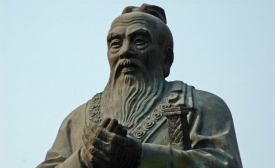confucius institutes
China is taking this cultural war seriously, on both domestic and international fronts. Beginning Jan. 1, two-thirds of entertainment programs on China’s 34 satellite channels, including game shows, dating shows and celebrity talk shows, were deemed “vulgar” and cut, making way for programs that “promote traditional virtues and socialist core values.”
China's soft power is not only coming from official diplomatic channels. Its average citizens have also been ambassadors for the country. Wherever the Chinese diaspora land, much evidence, anecdotal as well as statistical, confirms that the Chinese tend to become productive members of society without the help of affirmative action.
Soft power is a slippery term to define. How can we know for certain the motives of an actor?... Nonetheless, despite the challenge in defining the term it is clear for nearly all commentators that the concept refers to relations between nations and peoples – that is, soft power is a matter of national image building on the international stage.
Tel Aviv University president Joseph Klafter proudly announced that Israel's only Confucius Institute is to be found at TAU. As Israeli Prime Minister Netanyahu said, in coming years we’ll see a dramatic expansion of Israel-China ties, which will in part be achieved through a decision to bring 250 Chinese students to Israel on an annual basis.

The USC Center on Public Diplomacy was pleased to welcome Jay Wang, CPD University Fellow and Associate Professor, USC Annenberg School for Communication & Journalism to discuss his research project on China's Confucius Institutes in the United States
Confucius institutes are part of a global campaign, funded by Beijing, to promote Chinese language and culture. However, the involvement of the Chinese one-party state, and its soft power ambitions, have generated some opposition. The siting of these centres in universities and public schools also makes them contentious.
The infusion of Chinese government funding into international universities has enabled significant expansions in language teaching, cultural programming, and China-related conferences and symposia, but it has also raised fears regarding academic freedom and independence of teaching and research.
A cornerstone of China’s cultural diplomacy is Confucius Institutes at both Bishkek Humanities University and the Kyrgyz National University... the Beijing-funded institutes have infused their host universities with a Chinese flavor, paying for instructors and tailor-made course books that help some three thousand local students grapple with the tonal challenges of the Chinese language







